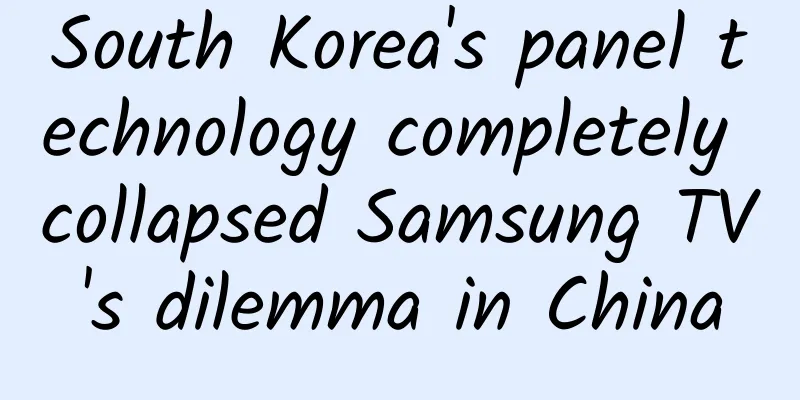South Korea's panel technology completely collapsed Samsung TV's dilemma in China

|
Recently, LG announced that it would sell its industry-leading key equipment for producing OLED panels to Chinese manufacturer Tianma Microelectronics. The equipment is the same as the equipment currently used by LGD in its production line, which has sparked industry discussion. The Korean industry is worried that if Chinese manufacturers obtain the equipment, they will narrow the gap with Korea in OLED panel production technology. The reason why LG made this decision is closely related to the current situation in which LG's sales in the display field in China are hindered. As we all know, in the field of color TV, Japanese and Korean manufacturers have always controlled the core technology and production lifeline for half a century. Now, China is gradually emerging and forming a three-way situation with Japan and South Korea. According to data provided by Aowei Cloud Network, the top five TV brands in the world last year were Samsung, LG, Hisense, TCL and Sony. The combined shipments of these five TV brands reached 105 million units, accounting for nearly half of the global TV shipments. Among them, Samsung's shipments were the same as in 2015, while Chinese brands Hisense and TCL grew steadily, while LG experienced a sharp decline for many consecutive years worldwide. In China, the world's largest consumer market, LG's situation is even more tragic. It has long been marginalized along with its mobile phone products. Samsung's situation is slightly better, barely ranking among the top six in domestic sales in 2015, but was squeezed out by Haier in 2016. After shifting their focus to South Korea, Japanese color TV companies fell into decline. Now it seems that Korean color TV brands will follow suit, ending the era of the three kingdoms and ushering in an era of Chinese dominance. However, compared with LG, Samsung still stands out in the global TV field. To date, Samsung has been the world's TV sales champion for eleven consecutive years, which is unprecedented. And unlike Internet TVs that rely on cost-effectiveness to pursue installation volume, Samsung's TV products are unique in the high-end TV market, which has kept Samsung in a virtuous cycle of "high profit-high R&D investment-high technology barriers-high price-high profit". It seems that Samsung's TV's king status in the TV market is still unshakable for the time being. But is this really the case? Samsung TV accidentally damaged by "friendly forces" In recent years, Samsung's mobile phone business has been a great teammate of Samsung TV. In 2015, Samsung sold 325 million mobile phones, and it also topped the sales ranking of the mobile phone market. And it continues to indirectly drive Samsung's other businesses, including TV, with its good brand image. Last year, Apple's lack of innovation became the target of public criticism, which was interpreted by Samsung as the best opportunity to overtake Apple. For this reason, Samsung made careful preparations and poured a lot of effort into the new Note flagship. In order to avoid numerical disadvantages, it even skipped the number "6" and directly named the sixth-generation large-screen flagship Note7. However, due to the eagerness to win, the company was too aggressive in battery technology, and soon after the Note7 was released, the battery exploded. Under the negative public relations tactics, the Samsung Note7 explosion quickly evolved into the most vicious accident in the history of mobile phones. At one time, the public's criticism, the interviews with relevant departments of various governments, and the bans broadcast by global airlines combined to form the largest "advertisement" in Samsung's history. Unfortunately, this "advertisement" was negative. Compared with the direct economic losses of tens of billions of dollars, the collapse of the brand that Samsung has painstakingly built over the years cannot be made up for overnight, and will inevitably continue to cause unpredictable damage to Samsung for a long time to come. After the Note7 explosion incident, a media survey of 1,000 Samsung users was conducted at the end of September last year, of which 34% said that they would no longer choose Samsung-branded mobile phones in the future. In contrast, according to data provided by Baidu Index, compared with the 120,000 daily searches for Galaxy S7 before its release, the search volume for S8 was only a pitiful 40,000, a drop in popularity of 67%. The TV business was also hurt by the explosion. After September 2016, with users questioning the Samsung brand, the popularity of Samsung TV searches on Baidu continued to decline, and was eventually surpassed by domestic TV brands such as Skyworth and Hisense. It is hard not to sigh that sometimes, there is only a "boom" between a great teammate and a bad teammate. Samsung appliance user: "Always keep a fire extinguisher at home in case of a Boom" As the saying goes, "Good fortune never comes alone, and misfortune never comes singly." The Samsung Galaxy Note7 "boom" brought more than just problems with Samsung's mobile phone line. Under the leadership of the "Boom 7" explosion, the explosion incidents of Samsung washing machines and TVs also made headlines. At the end of last year, Samsung Electronics and the U.S. Consumer Product Safety Commission announced that they would recall 2.8 million Samsung top-loading washing machines because the drum inside the washing machine may lose balance, cause violent vibrations, and automatically disintegrate. In serious cases, it is like an "explosion." Samsung received a total of 733 reports about excessive vibration of the washing machine or the top cover detaching from the washing machine, of which 9 reports involved injuries. The news of Samsung TV explosion is even more bizarre. Aunt Chen, who lives in Taizhou, had a Samsung TV that suddenly caught fire while turned off, causing economic losses of nearly 200,000 yuan. This incident, which originally happened on June 23, was reported in major media on September 20, after the Samsung Note7 explosion. However, what is even more bizarre is that three months after the incident, Samsung's response was just "it will be reported to the superiors." Indeed, Samsung TV has maintained the title of sales champion for 44 consecutive quarters, and its price is still high in today's world where domestic TVs frequently "break through the bottom price". Although it has outstanding display effects, the workmanship and quality of Samsung TV are difficult to satisfy people. Some of the frequent problems can even be attributed to "design defects". For example, the LA series TVs have a problem of "starting up slower and slower" due to capacitor burnout, and the ULED series TVs cannot start up due to fuse burnout. How common are these quality problems? Just call the Samsung TV after-sales service hotline and tell them the date of purchase and model, and the after-sales girl will be able to tell you the problem with your TV. Another outrageous thing is that the price of Samsung's after-sales service is staggering. The slow startup problem of the LA series TV is actually man-made damage, which is not covered by the warranty. The repair cost of this fault in Samsung's after-sales service is as high as 900 yuan, while the Internet is full of DIY tutorials on replacing capacitors, which can cure the problem at a cost of less than 10 yuan and are foolproof. Judging from these "burning" and "melting" accidents, the sarcastic remarks of Samsung users such as "When no one is at home, the power of Samsung appliances must be cut off" and "Always keep a fire extinguisher at home in case of a Boom" may reflect a sense of helplessness. Samsung TV faces tough battle as its technological advantage disappears The damage to Samsung's brand image may have a more profound impact on Samsung's TV business than its mobile phone business in the future. The reason why the brand effect is so important to Samsung TVs is that unlike the mobile phone industry where it has mastered a large number of core technologies, Samsung's technological advantages in the TV industry have been gradually disappearing in recent years. After its OLED technology was surpassed by LGD, Samsung shut down its TFT-LCD production lines and then announced that it would abandon its OLED TV plan and turn to the research and development of QLED. It also acquired QD Vision, a US quantum dot technology research and development company, in the middle of last year. Samsung said that the main reason for abandoning the OLED technology it had been developing for many years was the low yield rate, high cost and short life of large-screen OLEDs. Samsung believes that quantum dots, as inorganic luminescent materials, not only retain the advantages of OLEDs, but also have the advantages of low cost and long life. However, as quantum dot technology is an emerging technology that has only been around for a short time, there is still a long way to go before it can be commercialized. Currently, Samsung's so-called QLED TV is just a variant of LCD TV that uses quantum dots as the backlight source. In actual performance, it still cannot compare with the energy consumption and contrast of self-luminous OLED. In the LCD technology deadlock around 2009, Samsung took the lead in launching LED TV, trying to guide consumers from CCFL to LED, but it was later revealed that LED is not an upgraded version of LCD, but just an LCD TV with an improved backlight from CCFL, which misled many consumers. Today, Samsung is still playing the same trick. Experts say that if quantum dot TVs want to achieve the display effects in theory and surpass OLED at the commercial level, they still need to make several leaps in production technology and display technology, which is impossible to achieve in a short period of time. Today's so-called quantum dot TVs are still several steps behind OLED in performance, and even compared with Sony's dynamic backlight technology, the display effect is not outstanding. In fact, before quantum dot technology is finally put into use, the outcome of the quantum dot war is still an unknown, because it is not just Samsung that is deploying quantum dots, but all major TV companies and panel suppliers are involved; Samsung is not the only one at the forefront. Just recently, BOE announced that it has successfully developed an electroluminescent quantum dot screen, taking the first step towards what Samsung calls "the ultimate display technology." Samsung TV's dilemma in China behind its sales champion title Twenty years ago, Japanese companies were still the absolute leaders in the television industry, and brands such as Sony, Sharp, and Panasonic still seemed unsurpassed. But the industry reshuffle came so suddenly. Faced with the rolling LCD craze, Sony was still immersed in the superiority of Trinitron; in the face of LED and OLED technology, Sharp, the father of LCD, remained unmoved; and Panasonic, which realized it later, placed all its bets on PDP. As the saying goes, “there is nothing new under the sun”, this story is now being played out again with a different protagonist. This time, the new heroes on the world stage are Chinese TV manufacturers. Judging from global sales, Samsung still holds the top spot, but in China, which is known as the new indicator of the global economy, the Samsung brand is under scrutiny from consumers. In terms of brand, Samsung has been plagued by negative news and has lost the basic trust of Chinese consumers; in terms of quality, Samsung's QLED TV, which is a new bottle with old wine, is no match for Sony's LCD with dynamic backlight technology in terms of actual display effect; in terms of after-sales service, the policy of exhausting all resources is handing over existing users; in terms of price, the inflated prices of Samsung TVs also make it difficult for Chinese people, who are increasingly sensitive to service and price, to accept. Moreover, with the popularity of smart TVs, the color TV market has risen again under the stimulation of new experiences. The last time the industry was reshuffled, Samsung and LG of South Korea reaped the dividends of technological change. Now, the arrival of Internet TVs such as LeTV, Xiaomi, Whaley, Coocaa, and TCL has successfully enabled the Chinese color TV industry to reap the dividends of the second spring of color TV. In addition, the active overseas layout is also one of the reasons why the growth rate of Chinese TV enterprises' global market share surpasses that of Japan and South Korea. A new round of acquisitions started in 2015, with Skyworth acquiring Germany's Metz, Hon Hai acquiring Sharp, Midea acquiring Toshiba, and LeTV acquiring Vizio. The overseas layout of Chinese TV enterprises has entered a new era, which also made the Chinese color TV industry the first in global regional sales in 2016 for the first time. While Samsung is basking in its past glory, Chinese panel manufacturers are trying to catch up. Samsung's Korean teammate LG has indirectly admitted that it has failed in China by reselling its OLED technology to China. Will this also be the final fate of Samsung in China? As a winner of Toutiao's Qingyun Plan and Baijiahao's Bai+ Plan, the 2019 Baidu Digital Author of the Year, the Baijiahao's Most Popular Author in the Technology Field, the 2019 Sogou Technology and Culture Author, and the 2021 Baijiahao Quarterly Influential Creator, he has won many awards, including the 2013 Sohu Best Industry Media Person, the 2015 China New Media Entrepreneurship Competition Beijing Third Place, the 2015 Guangmang Experience Award, the 2015 China New Media Entrepreneurship Competition Finals Third Place, and the 2018 Baidu Dynamic Annual Powerful Celebrity. |
Recommend
Alpha Egg AI Dictionary Pen X10: A personal tutor in a pencil case
In today's internationalized era, English pro...
How to do content operation? It’s all here!
"Content" in a broad sense includes mus...
1 model + 5 steps to increase e-commerce conversion rate 10 times
First, the conversion rate of goods must be impro...
What exactly connects the PGC and UGC of the community?
Watching the large amount of content being genera...
Poisonous! Don't pick mushrooms in the wild
It is understood that the southwest and central C...
E-commerce operations: product stratification and operation strategies!
With the development of the online retail environ...
What? The "top-tier" giant panda can actually bark like a dog? 7 little-known facts about giant pandas
Speaking of our national treasure The first thing...
Car lights: Without me, no matter how good the car is, it’s useless
If we were to select the most important means of ...
In-depth analysis of information flow, splash screen, and incentive video advertising!
Mobile advertising comes in many forms. For mobil...
Doing big things quietly! How to manually control the docking of Tianzhou-2 with the space station?
Yesterday at 7:55 After about 2 hours Shenzhou 13...
Electric Technology Car News: Peugeot 5008 vs. Kodiaq: Which is more important, appearance or performance?
In today's age where everyone looks at their ...
Wu SIR's "Short Video Sales Basic Practice Course" teaches you how to choose hot products, understand the short video traffic password, and correctly start an account
Training course video lecture content introductio...
Next year's iPhone may use a rear triple-lens camera to replace ToF sensing technology
According to market rumors, the iPhone that Apple...
Operational case: The growth path behind "Zebra English" monthly revenue exceeding 100 million
What growth paths did Zebra English take to achie...
Express delivery companies have fully resumed work! How can couriers prevent infection? What are the safeguards?
As the epidemic develops, logistics in many parts...









